A lot of what we do in the Montessori environment is mirrored and enhanced by what we do with the children at home. Freedom, accountability, purpose, and responsibility – these are attributes that drive learning. These attributes are acquired and exercised particularly at home.
With schools being shut and children spending time at home, we thought this would be a great time for parents to read about the Montessori approach. You can always access material on the Montessori philosophy and our blog is a great resource. We do believe that reading Maria Montessori’s books, for instance, will open your world to the many possibilities that exist in your child’s world. I think that these books will shape any parent’s perspective and encourage us to build a bond with our children.
Dr. Maria Montessori wrote, “Education is a natural process carried out by the child and is not acquired by listening to words but by experiences in the environment.” As you know, the environment at home can be a teacher too. Here are books for parents that show you how your child thrives in a Montessori environment.
Best Montessori Books for Parents:
1.
Book: The Absorbent Mind
Author: Maria Montessori
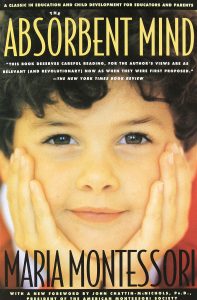
I have met many Montessori parents who have told me that The Absorbent Mind is one of their favorite books on the Montessori philosophy, and I can see why. This book describes the child until he or she is six years old. The book outlines what makes children who belong in this age group so full of possibilities. They absorb so much around them and are hungry for experiences. They want to touch different textures, they want to see and hear different things. They want to climb and look everywhere, they truly are seekers.
So much of what is described in The Absorbent Mind will be appealing to parents because Maria Montessori talks about the ‘Link of Live,’ which is a child’s love for parents or the adults in the home. Children are constantly mirroring and imitating the adults around them. It is interesting that so much of what they absorb is both useful and useless, positive and negative. These are essential experiences and emotions, nonetheless, and shape them into complete individuals.
This book is an absolutely fascinating look into that wondrous mind that is whirring away in that little person who is sitting beside you. One of the things Montessori talks about in this book is also Horme, which is an idea that has often fascinated adults. When we are children, we are propelled by curiosity. Ever noticed how a baby won’t rest until he or she touches the quacking toy duck that is out of reach? Or how children try their best to climb out of a crib, devising all tricks in the book and not tiring of failing? They don’t care how many times they try to climb out, but their little feet slip down the wooden bars. For them, every attempt is a brand new step towards a new world. As an adult, I love and wish I had that curiosity in spades.
2.
Book: The Secret of Childhood
Author: Maria Montessori
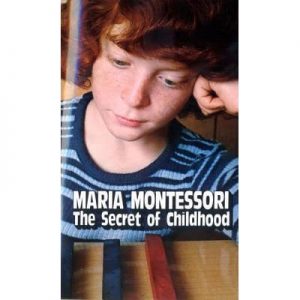
There is a passage in The Secret of Childhood where Maria Montessori talks about how she teaches children in her Casa dei Bambini how to blow their noses with handkerchiefs. She expects them to start laughing when she blows her nose with care and as unobtrusively as possible. Instead, the children watch in rapt attention and when she is done, they applaud. Dr. Montessori was so stunned. The more she thought about their reaction, the more she was convinced that parents often scolded, chided, or nagged their children to blow their noses but never thought them how to blow their noses. They never demonstrated or exhibited it. Instead, they pinned hankies onto the children’s smocks, which showed a lack of trust in their abilities. “I have come to appreciate the fact that children have a deep sense of personal dignity,” she writes in this book.
The book has been described as Dr. Montessori’s examination of a child’s personality with the precision of a scientist and the warmth of an educator. This book is a wonderful way to understand the human being you have brought into this world. We often brush aside their thoughts or worries and never try to understand their motives. This book is a lovely way to try and recognize your children as people with minds of their own. This is a lovely parenting book in its own right.
3.
Book: MONTESSORI, The Science Behind the Genius
Author: Angeline Stoll Lillard
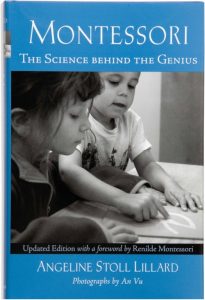
Dr. Maria Montessori developed her methodology more than 100 years ago. Many parents have a valid question to ask of Montessori — is it still relevant and does it pass the test of modern-day developmental psychology? One should understand that psychology and our understanding of the human brain keep changing every few years.
Dr. Angeline Stoll Lillard, however, does think that Montessori’s practices stand up to modern-day psychology and its observations. Dr. Lillard is a Professor of Psychology at the University of Virginia. In this book, Dr. Lillard examines 8 of Maria Montessori’s ideas about a child’s learning. She then explains how contemporary neuroscience and research support each of these 8 principles. Some of these 8 philosophies that have been echoed and lauded in present-day education research; the relation between movement and learning, working with mixed age-groups and peer-based learning. These are truly phenomenal ways of learning and growing.
This book talks about all the activities done in a Montessori environment, why they are done, and how they help your child. Is the Montessori method too rigid or is there more free-flowing purpose behind its structure? This book is a wonderful way to understand and demystify Montessori.
4.
Book: Montessori from the Start
Author: Paula Polk Lillard and Lynn Lillard Jessen
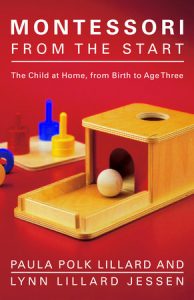
This book describes how parents can get their infants in their journey towards self-formation and self-realization. How do you design your baby’s environment so that he or she learns the most from it? What about food and eating habits? How do you encourage movement and exploration? What about language development? One of the best parts about this book is its description of a child’s ‘sensitive periods’ for learning skills. Most of us only focus on ‘sensitive periods’ for reading and writing but there are sensitive periods for learning crucial life skills, including toilet training. The book is a guide of sorts that is filled with practical examples and is a treat to read.
The book also has instances of how we can encourage independence and action with purpose. As parents, we have never been encouraged to look at a child’s purpose and the larger design when it comes to what they do and how they view the world.
5.
Book: Nurturing the Spirit
Author: Aline D. Wolf
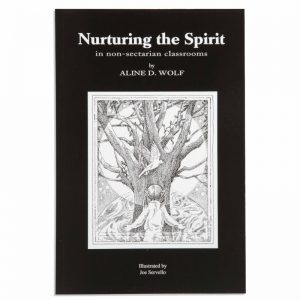
Over the last few weeks, we have noticed how nature has healed, even though the pandemic has brought us indoors. In this time, we have noticed a child’s individual spirit shine through and have seen it in close proximity. We marvel at how they value nature and how they can connect to things in a spiritual sense.
Aline D. Wolf talks about spirituality in non-sectarian terms, without religion, rituals, or strictures. When a child’s spiritual inclinations are ignored, she says, nothing worthwhile can develop in his or her. A keen spiritual sense is honed by connections with human beings and the community. Reflection also hones this sense. Montessori’s cosmic education at the elementary level is a wonderful way of harnessing this spiritual drive.
With all the problems in the world today, spiritual awareness truly matters, for both children as well as parents. The book shows us how we can spiritually nurture our children.
Best Books for Parents on Raising Kids
6.
Book: Tough Times, Strong Children – Lessons from the Past for Your Child’s Future
Author: Dan Kindlon, Ph.D.
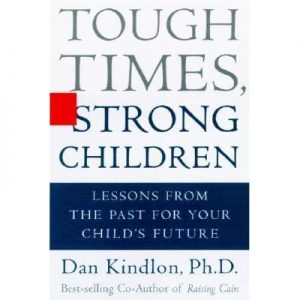
This is such a topical book, isn’t it? Our children may appear laidback, doing their own thing now that school is shut and outdoor movement is curtailed, but they too are processing so much right now. The book talks about the challenges that children and their families face in different countries. It also tells us how we can prepare them to be resilient yet emotionally aware individuals who cut themselves some slack when the going gets tough.
Dr. Kindlon gives great examples from history — families surviving the Great Depression, concentration camps, violence, and so much more. All the stories and scenarios may be different, but the one connecting factor is the moral support offered by parents. As adults, we too feel afraid, and while we should not hide our emotions from our children, we also need to display courage, empathy, and grace under fire. A strong belief system really matters.
The book isn’t just full of anecdotes — Dr. Kindlon brings his knowledge of psychology to the fore and tells us why some children can deal with problems more than others. We cannot recommend this book highly enough!
7.
Book: Last Child in the Woods – Saving Our Children from Nature-Deficit Disorder
Author: Richard Louv
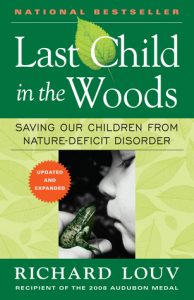
I have seen fidgety and irritable children transform after a walk in the park or when they commune with nature. There is no doubt about it. Nature is therapeutic and humans are designed to spend time outdoors.
Last Child in the Woods gave rise to the much-used phrase, ‘nature deficit disorder.’ This bestselling book talks about the very real danger lurking in plain sight – the child who prefers gaming or instant gratification indoors to playing and discovering the outdoors. The book talks about the family’s role in changing this, but it also describes how even schools like to keep children closeted indoors.
The importance of free and outdoor play cannot be emphasized enough. American researcher and scholar Peter Gray believes that outdoor play gives children an evolutionary advantage, a ‘hunter-gatherer’ instinct that strengthens other skills.
This book is an amazing insight into a child’s relationship with the natural world. As Louv writes, “The woods were my Ritalin. Nature calmed me, focused me, and yet excited my senses.” Don’t miss out on reading this book!
8.
Book: My Heart I Give to Children
Author: Vasily Sukhomlinsky
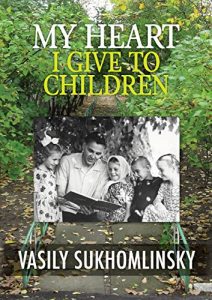
Vasily Sukhomlinsky’s My Heart I Give to Children is a bestselling educational classic that has sold millions of copies in 30 languages. This book talks about the author’s pioneering work with thirty-one students in rural Ukraine during an experimental preschool year and the subsequent four years of their primary schooling. His school became world-famous for his game-changing approach. Sukhomlinksy’s method was to look at schooling as more than just reading, writing, and arithmetic. He focused on a child’s complete development and his or her connection to the natural world.
An approach that was many years ahead of its time, this book will delight and impress you. It will open your mind to a world of possibilities when it comes to schooling our children, such as how children’s brains function and develop, how to help children develop empathy for others, their connection with nature, fostering an intrinsic love for learning, how to support children struggling to acquire skills in literacy and numeracy, how to nurture children’s souls when there are negative influences of mass media and more.
This book and Sukhomlinsky’s work has influenced a generation of teachers and educators.
I hope you found this booklist interesting and helpful. If you have any questions, or just want to discuss, do not hesitate to leave a comment here. Also, let us know in the comments below your list of best books for parents that helped you in your parenting and become a great parent for your child.

 May 28th, 2020
May 28th, 2020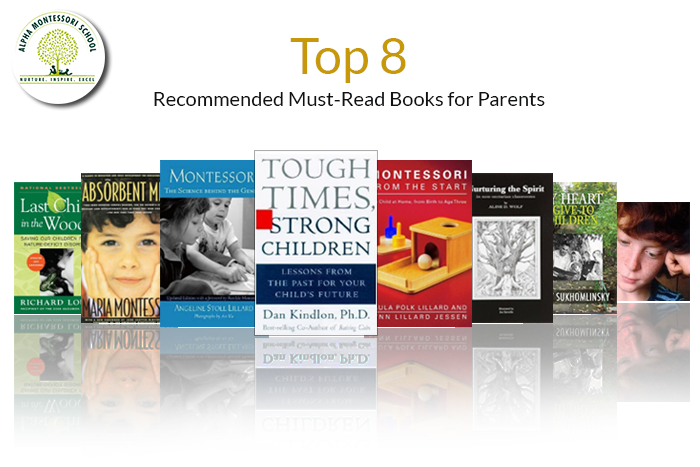
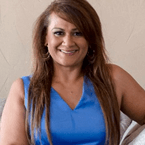
Like!! Really appreciate you sharing this blog post.Really thank you! Keep writing.
Thank you for your sharing. I am worried that I lack creative ideas. It is your article that makes me full of hope. Thank you. But, I have a question, can you help me?
Your point of view caught my eye and was very interesting. Thanks. I have a question for you.
Your article helped me a lot, is there any more related content? Thanks! https://www.binance.com/sl/register?ref=OMM3XK51
Your article helped me a lot, is there any more related content? Thanks!
Your article helped me a lot, is there any more related content? Thanks!
Бездепозитные бонусы 2025 https://azino777.shop
Thanks for sharing. I read many of your blog posts, cool, your blog is very good.
I’ve started using CBD gummies like https://www.cornbreadhemp.com/products/full-spectrum-cbd-gummies , and they’ve made a noticeable contrast in my routine. They’re submissive to utilize, taste monstrous, and accommodate a elemental modus operandi to incorporate CBD into my day. I’ve originate they support me put one’s feet up and increase my siesta after a crave day, which has been a huge benefit. The in keeping CBD dosage in each gummy is a humongous plus for the sake of managing intake. If you’re considering CBD, gummies are an select option to start with—legitimate draw up persuaded you settle upon a incorruptible brand in regard to the greatest results!
Your point of view caught my eye and was very interesting. Thanks. I have a question for you.
Thanks for sharing. I read many of your blog posts, cool, your blog is very good.
fvGpw9R0kmj
7Lys1dHEQ2j
luqycaHE2rG
W2YtDGkrsOX
x19wg2FvH1g
b0xQArg3Y6H
6lspLtE3Dxw
Ci6FfDFefjz
bFdX4HI6mPJ
yrPckLV1T6u
IiT5VgpivqH
p7oYTUxL5Zc
3Rph75vVCX5
8iiRPevaawr
EXtqoYZD0HC
9I0TiGK8fcp
SbY0CQQRvbj
ZBJoAPPlX3R
fKFnVWZbICW
0lXLJVxVvks
xASiStkJuGY
Nkhe0X2E59G
2Fq4aUxMvIl
Muh7DKC83xA
v4AwAbjytTw
RWMWA1Oe6fY
AojMODMlsze
waiP7epjPi0
ATy1RpzeXSk
RuX0wK4WZXW
dETB865Bwrs
08tsSmmLcGt
2eHaQKkNGK2
5YGFvUC5pDh
eKn5z8eolvc
9rHPSNDlfpB
Thanks for sharing. I read many of your blog posts, cool, your blog is very good.
Your point of view caught my eye and was very interesting. Thanks. I have a question for you.